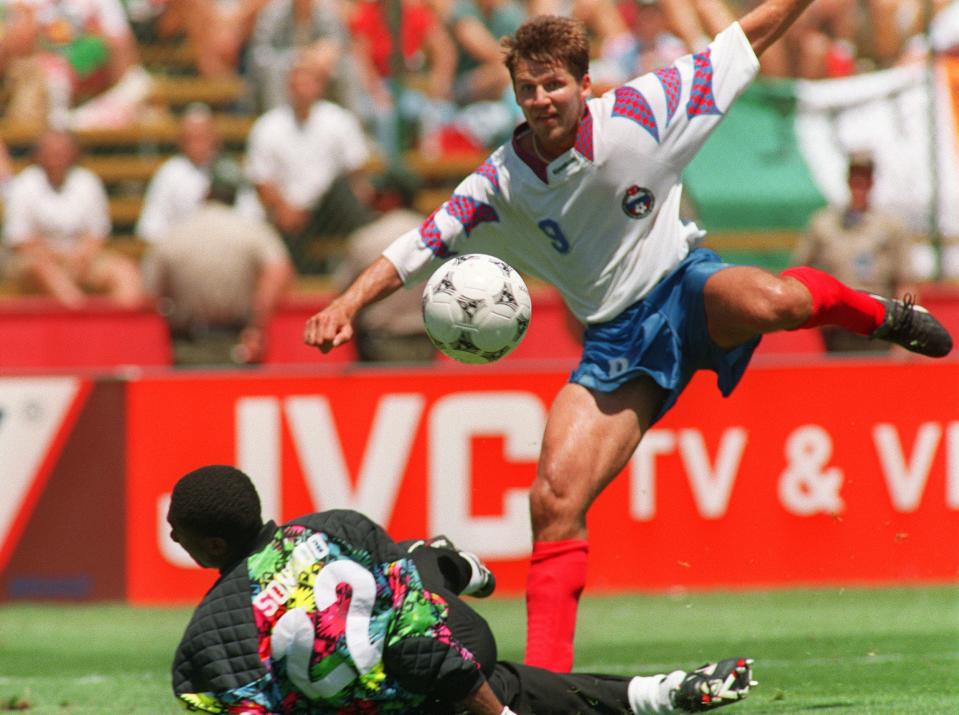World Cup one-hit wonders: Oleg Salenko - Russia's five-star hero at USA 94

The best strikers tend to be noted for efficiency. And, in the history of international football, there has arguably never been anyone quite as efficient as Oleg Salenko. He scored six goals for Russia. All came at in the 1994 World Cup. They earned him a share of the Golden Boot, along with Hristo Stoichkov, even though he only played in the group stage. Few can rival his average of two goals per game in World Cups, or one every 36 minutes on the pitch.
No one else – not Pele, Ronaldo, Diego Maradona, Gerd Muller or Miroslav Klose – has ever scored five goals in a World Cup game. And to make it odder, Salenko’s record-breaking feats were all in vain. He is a statistical anomaly, an extraordinary outlier, a man who only won eight caps for Russia and yet who made history.
READ MORE: World Cup fixtures and TV schedule
READ MORE: 5 of the most lethal groups of death
READ MORE: World Cup 2018 – The team by team guide
READ MORE: World Cup 2018 – England draw ‘favourable’ group after dodging giants
Were Salenko a quarter of a century younger, he would be assured of a longer international career, given Russia’s lack of high-class forwards. Yet he was not merely playing in an era when talent was plentiful. He was a product of his time, the first generation of Russian footballers to play abroad after the collapse of Communism. He won the Golden Boot while playing for Logrones, a club that no longer exists. He represented two countries; three including his Under-20 caps for the Soviet Union. In an auspicious sign, he was the top scorer in the Under-20 World Cup in 1989, proving what could be accomplished by being prolific in group stages.
His senior international debut came for Ukraine before he switched allegiances to play for Russia. He had one parent from each of the newly independent countries and, after being born in Leningrad, as it was then known, was playing for Dynamo Kiev when Ukraine selected him for their first ever international. He had gone to Spain, scoring 17 times for Logrones in 1993-94, when the 1994 World Cup came around.
Perhaps Salenko would not have been selected were Russia’s a happier camp. Fourteen players had signed a letter complaining about “sloppy and unprofessional preparations,” as Andrei Kanchelskis described them in his autobiography, and manager Pavel Sadyrin. Kanchelskis, Igor Shalimov and forwards Igor Dobrovolski and Igor Kolyvanov were among the high-class players who refused to go to the World Cup.
Perhaps Russia’s eventual fortunes showed they were right. Perhaps they were just ill-fated. “We were incredibly unlucky that year,” Salenko told FourFourTwo. “Our group had Brazil, who went on to win the tournament, and Sweden, who finished third.”
He came off the bench in a 2-0 defeat to Brazil but started against Sweden, putting Russia ahead from the penalty spot before Tomas Brolin and Martin Dahlin secured victory for the eventual semi-finalists. Meanwhile, the fourth team in the group, the 1990 quarter-finalists Cameroon, had only taken one point from their first two games.

Yet with the four best third-placed teams also progressing to the last 16, Cameroon could still advance. This was not a meaningless match for them, though their performance indicated otherwise. “In those days African teams could still be a little crazy with their tactics,” Salenko told FourFourTwo. “As soon as they went a goal down they started to chase the game and rush forward in great numbers.”
So it proved. He opened his account with a low drive. While Cameroon complained about a free kick, he caught out their dozing defence to score his second. His hat-trick came before half-time and from the penalty spot. Then, in a game of records for both side’s strikers, the 42-year-old Roger Milla became the World Cup’s oldest scorer.
Two more clinical finishes to Salenko’s tally to five. Russia won 6-1. “The night before the game I dreamed I was going to score a lot of goals,” Salenko told Fifa.com “You sometimes get premonitions like this.” Even he, though, did not think he would score that many.
But the enormity of his achievements initially passed him by. Salenko spent 90 minutes after the match doing a drugs test; it was not made easier by the reality he had been dehydrated by the California heat. Nor, as one who did not speak English, had he understood the announcements on the tannoy. “I only fully realised that I held a World Cup record after I’d finished my career,” Salenko told Fifa.com.
Remarkably, his international career ended then. Oleg Romantsev, who had been Kanchelskis’ pick all along, replaced Sadyrin as manager and did not choose Salenko; the forward said it was because “Romantsev didn’t like the fact that I had a bigger reputation than him.” Salenko went on to Valencia and Rangers, finding the Scottish league “very boring,” he later said. He started to suffer from injury problems. His career petered out.
And yet he has a unique form of immortality. He is reminded of his 1994 exploits, he told FourFourTwo, “every day. That’s the great thing about the World Cup – the whole world is watching, and if you do something spectacular you’ll be remembered forever.”
He still has the memories and the mementoes. In 2010, he was talking of selling off his Golden Boot after incurring debts in the global financial crisis that finished off Logrones. Thankfully, he did not and it is now on display in Kiev’s Olympic Stadium. So while Russia host the World Cup for the first time, their only Golden Boot winner’s prize is in Ukraine, the country he played for without scoring.


